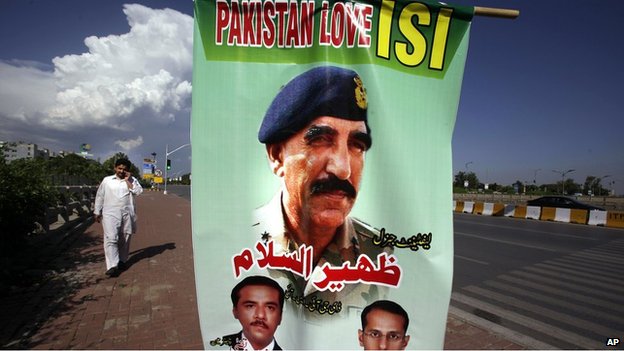
It is not too much to say that the ISI is one of the most powerful, if not the single most powerful organisation in the country. Certainly that is the perception in the minds of many of the shadowy security agency that, even if its reputation does not quite live up to the reality, was for decades spoken of only behind closed doors, and even then using vague allusions instead of concrete names. Recently, however, the ISI has not only come out of the shadows, but it has done so in a most extraordinary way – and one that shows signs of dangerous desperation.
The ISI has long invoked fear, not only in the hearts of foreign agents, but among our own citizens as well. Whether they were referred to with unspecific terms like ‘establishment’ or ‘sensitive agency’, people were uncomfortable even uttering the agency’s name, not even to speak of openly criticising it. During the past decade, however, that began to change. As our fellow countrymen continued dying by the tens of thousands, people began to ask what exactly the ISI was doing to stop the terrorists. Then, when the most notorious terrorist and most wanted man of the world Osama bin Laden was discovered and killed by American special forces while hiding outside Kakul military academy, difficult questions began to be asked not only in private, but in the public as well. Was the ISI, supposedly the most powerful agency in the country, complicit in hiding an international terrorist, or were they actually so incompetent that they had no idea Osama bin Laden was here? These were questions with no good answers, but the fact that the raid was carried out by foreign agents provided a distraction and the national attention was turned away from the ISI’s role to the American role and the uncomfortable questions were neatly packed away.
But then new questions began to arise about missing persons, and this time the dirty laundry was being washed very publicly not by the media, but by the courts. Now people wanted answers about whether the premiere intelligence agency was killing and dumping the bodies of our own people without remorse or accountability. These disappearances could be blamed on the actions of insurgents, but what about reports of the kidnapping, torture, and killing of journalists? Umar Cheema’s saga received international attention, but it was when the body of Saleem Shahzad was discovered rotting in a ditch that the ISI found itself featured in headlines of the worst sort. It surprised no one, then, when Geo leveled similar accusations so publicly following the attempted murder of their prominent anchor Hamid Mir.
Much can be said about the irresponsibility of Geo’s reporting, and I am in no way defending the way that they publicly accused the ISI and flashed the photo of DG ISI on the screen. What is extraordinary, though, is that the ISI’s reputation has fallen to such depths that it was possible for a media group to believe they could get away with it – something that would have been beyond unthinkable only recently.
There has been another extraordinary reaction, though, and one with equally if not more dangerous possibilities, and that is the response of the ISI to its diminishing reputation as beyond the lines of acceptable discussion. The large ‘Pakistan Love ISI’ posters bearing the photograph of DG ISI as if he were the leader of a political party are equally as regrettable as Geo’s actions. Such obvious PR tactics should be beneath the dignity of a premiere intelligence agency. More concerning, however, are the pro-military rallies being organised by jihadi groups across the country.
A decline in public respect for the military and intelligence agencies presents a national security problem. COAS Gen Raheel has recognised this dilemma and vowed to preserve the military’s honour at all costs, but whoever is responsible for preserving this honour appears to be dangerously tone deaf. Public sentiments about the military have declined exactly because of heavy-handedness and the failure of policies of using jihadi groups as proxies. Using these same tactics won’t increase respect for the military, they will weaken it further. To turn the tide, the military needs to demonstrate accountability for those in its ranks and a commitment to protecting the common man, not jihadis.
![]()





